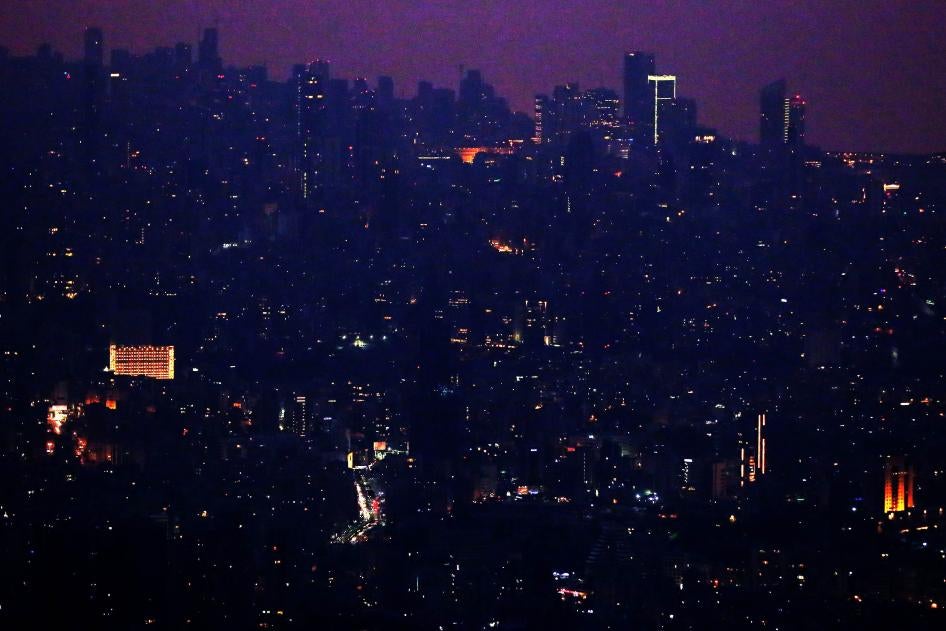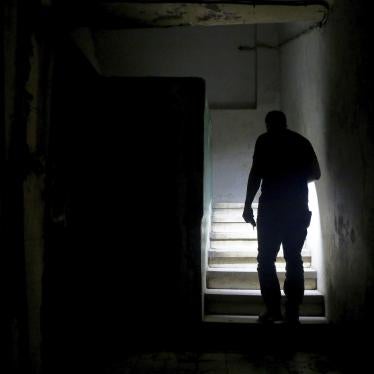(Beirut) – The Lebanese government’s continued mismanagement of the electricity sector and its failure to carry out key reforms is diminishing the public’s already-limited access to electricity, Human Rights Watch said today.
On August 17, 2024, Lebanon’s only operational power plant shut down after the state-run electricity company, Electricité du Liban (EDL) ran out of fuel, resulting in a complete nationwide power outage. The outage left residents and key state institutions, such as the airport, water pump stations, sewage systems, and prisons, without state-provided electricity for more than 24 hours, and reliant on costly and highly polluting private diesel generators.
“The government’s continued willful mismanagement has plunged the country into complete darkness as residents are left to pay the price,” said Ramzi Kaiss, Lebanon researcher at Human Rights Watch. “Failing to implement key reforms that would enable access to continuous, accessible, and clean electricity means that Lebanon will lurch from one acute power outage to the next with no end in sight.”
A 2023 Human Rights Watch report documented that Lebanon’s electricity crisis is preventing people in Lebanon from realizing their right to electricity, as well as other rights, including to education, health, water, sanitation, and a healthy environment.
The South Lebanon Water Establishment, the public utility responsible for supplying water and treating wastewater across southern Lebanon, published a statement on August 18 calling on people to ration water use “to the maximum extent possible” in light of the current power outage. It said that the utility’s reliance on private diesel generators will “not be enough to provide the sufficient quantities of water to supply all the cities and towns within the jurisdiction of the establishment.”
The August 17 power outage resulted from the government’s failure to make overdue payments to the Iraqi government for supplying Lebanon with heavy fuel oil that the Lebanese government can then swap for fossil fuels compatible with Lebanon’s power plants. The last operational plant shut down after the plant’s fossil fuel reserves were depleted, EDL said, leading “to a total blackout across all Lebanese territories.”
Media reported that the Lebanese government had asked Iraq to forgive part of Lebanon’s unpaid debt for previous fuel shipments, which caused Iraq to delay further shipments. On August 18, Algerian authorities stated that they will supply Lebanon with fuel to operate its electricity power plants in wake of the power outage, and sent several thousand tons on August 22, but no further details on the arrangement are publicly available. On August 19, Prime Minister Najib Mikati asked Lebanon’s Central Inspection, the government agency responsible for overseeing public agencies, to investigate the power outage.
On August 21, Human Rights Watch sent a letter to the Energy and Water Minister with questions about the blackout, the status of promised reforms, and government steps to resolve the problem, but has not received written responses to the questions.
For almost 30 years, Lebanese authorities have failed to properly manage the state-run electricity company, resulting in widespread blackouts. Between 2005 and 2020, the Lebanese government purchased billions of dollars’ worth of tainted, faulty fuel from a subsidiary of the Algerian state oil company, Sonatrach. The decades of unsustainable policies and fundamental neglect, the result of elite capture of state resources, alleged corruption, and vested interests caused a complete collapse in 2021 amid the ongoing economic crisis, leaving the country without power through most of the day.
The government, including the Energy and Water Ministry, which is responsible for the overall strategic planning and policy development for electricity, has failed to implement key reforms that would unlock donor funds, enable greater access to continuous, accessible, and clean electricity from renewable sources, and rapidly phase out the use of fossil fuels.
In December 2023, Lebanon’s parliament passed the Distributed Renewable Energy Law, which seeks to organize the renewable energy sector and increase the number of hours of electricity provided by integrating renewable energy sources into the country’s electricity grid and to allow private renewable energy sources to sell electricity. However, the law has yet to go into effect because the government has failed to activate and appoint the members of the Electricity Regulatory Authority (ERA), the independent regulatory body mandated with overseeing the electricity sector since 2002.
“The ERA has not been appointed because of politics,” Diana Kaissy, former executive director of the Lebanese Oil and Gas Initiative, told Human Rights Watch. “The political parties are behind forbidding the relinquishing of powers of the ministry to the ERA.” In the absence of the ERA, the Council of Ministers, particularly the Energy and Water Minister, exerts almost complete control with little transparency and accountability.
In 2023, the World Bank conditionally agreed to finance agreements for Lebanon to import electricity and methane gas from Jordan and Egypt if Lebanese authorities carried out reforms, media reported. These included activating the ERA, auditing EDL, and improving collection of electricity bills. But the government, in addition to not appointing the ERA, has not published the required audit.
The World Bank should refrain from funding any new energy projects that rely on fossil fuels and instead provide technical and financial support to expand renewable energy infrastructure, Human Rights Watch said. The two main measures that the World Bank lists rely primarily on fossil fuels as the primary source of electricity, with renewable sources remaining relatively limited and largely seen as a last resort.
Human Rights Watch found in a 2023 report that Lebanon has almost unlimited renewable energy potential, particularly from solar and wind, with some experts saying that Lebanon could transition to 100 percent renewable energy utilizing wind, solar, and hydropower by 2035 using existing technologies.
In 2024, the main electricity company provided about four hours of electricity a day, media reported, while people who can afford it use highly polluting private diesel generators to supplement that supply. An informal and largely unregulated private diesel generator industry valued at around US$3 billion has mushroomed across the country.
The reliance on heavy fuel oil-powered plants and diesel generators generates significant air pollution that has taken a huge toll on the environment and had significant impacts on people’s health, possibly killing thousands each year in Lebanon, according to a Greenpeace estimate in 2020.
The Energy Minister has promised to increase the state-provided electricity supply up to eight hours a day, but energy experts told Human Rights Watch that this plan is unrealistic.
“All the current plans are not realistic,” said Christina Abi Haidar, a lawyer and independent energy consultant. “They do not address the current status quo, in light of the economic collapse. If we have fuel coming in for generators there will be no reform to the sector because the private generator profiteers are mostly politically affiliated cartels, and their business is going well. Who closes a business that brings them money?”
Since the beginning of cross-border hostilities with Israel on October 8, 2023, Israeli strikes in south Lebanon have also resulted in severe damage to electricity, water, and telecommunications infrastructure there, the United Nations Office for the Coordination of Humanitarian Affairs (UNOCHA) said. On August 4, an Israeli strike destroyed an electricity substation in al-Taybeh. Israeli artillery shelling also damaged a power distribution station in Marjeyoun on July 13, exacerbating the electricity supply disruptions in the area.
The Lebanese government should, in the current fiscal and electricity crisis, immediately ramp up local and utility-scale renewable energy generation projects to decrease its reliance on expensive, and heavily polluting fossil fuels, Human Rights Watch said.
Everyone has the right to an adequate standard of living, as set out in treaties like the International Covenant on Economic, Social and Cultural Rights (ICESCR), that are binding in Lebanon. Human Rights Watch has found that this right should also include, explicitly, a right to adequate, accessible, clean and sustainable electricity. Lebanon should recognize the right to electricity and enact a strong strategy to implement it as rapidly as possible.
Lebanon’s government should take immediate steps to ensure that all residents have a continuous, accessible, clean and sustainable supply of electricity from renewable energy sources. It should implement the 2023 Distributed Renewable Energy Law and ensure accountability and transparency in the electricity sector by activating the ERA and conducting an audit of the state-run electricity company.
“The time for excuses and dithering is over,” Kaiss said. “The government should no longer delay the needed electricity sector reforms to transition to a model of, clean and sustainable electricity from renewable energy sources.







